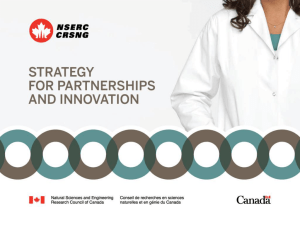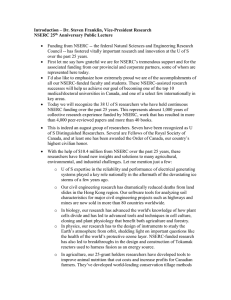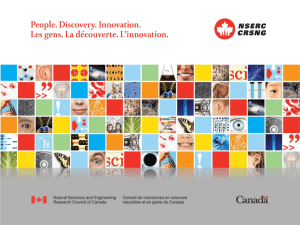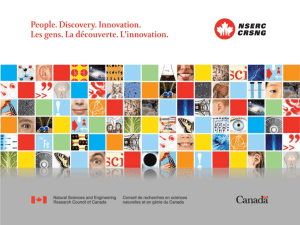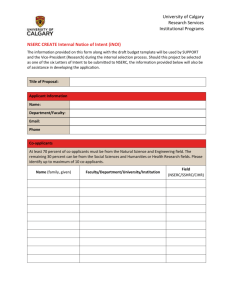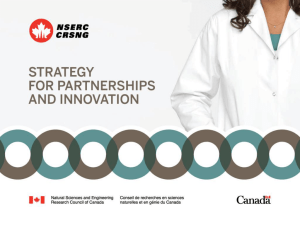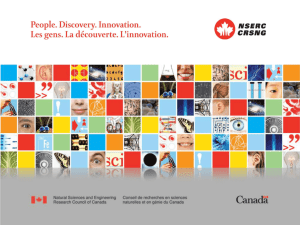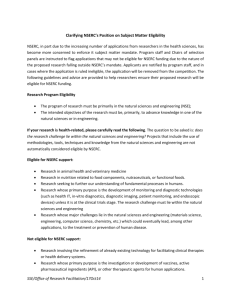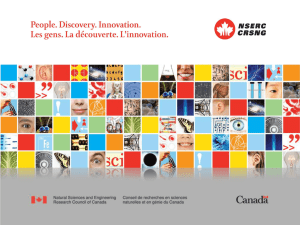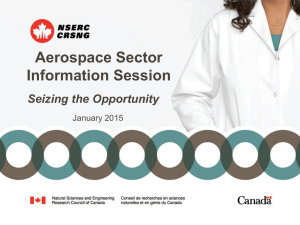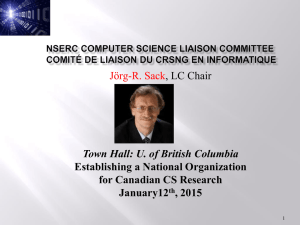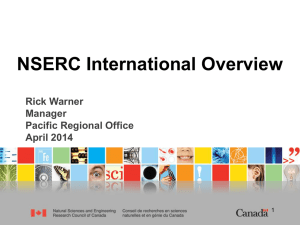idea to innovation (i2i) grants
advertisement
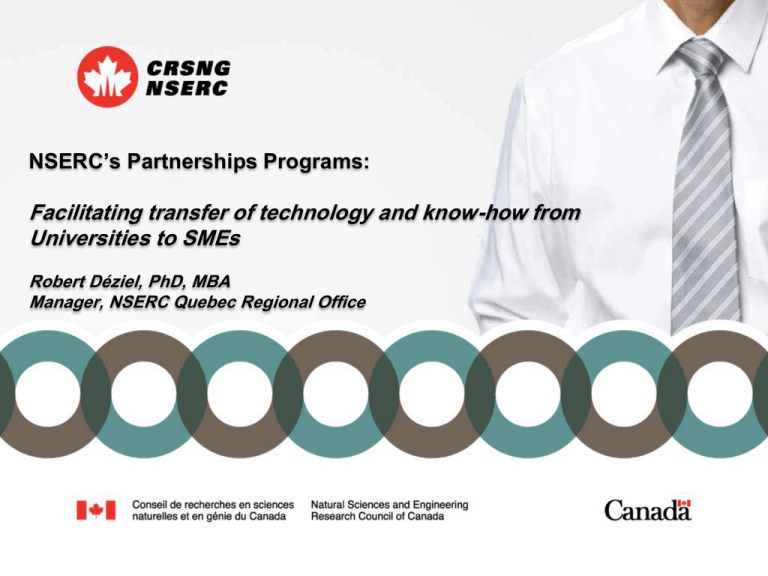
NSERC’s Partnerships Programs: Facilitating transfer of technology and know-how from Universities to SMEs Robert Déziel, PhD, MBA Manager, NSERC Quebec Regional Office NSERC FACTS AND FIGURES The Natural Sciences and Engineering Research Council of Canada (NSERC) is a federal agency responsible for funding natural sciences and engineering research in Canada Budget 2013-2014: $1.1 billion $250 million in Quebec 764 industry partners $51 million in industry contributions 2,649 NSERC-supported professors 1,536 student grants 260 NSERC-supported research chairs $300 million for partnerships programs between universities or colleges and enterprises in Canada OPTICS AND PHOTONICS SNAPSHOT NSERC FUNDING $16.8M in 2011/12 • $8.4M in Research Partnerships Programs Funding level doubled since 2002 50 participating companies in last 3 years BOOST YOUR RESEARCH AND DEVELOPMENT CAPACITY NSERC PROGRAMS (GRANTS) SUPPORTING TRANSFER OF TECHNOLOGY AND KNOW-HOW * Engage Grant (EG) Collaborative Research and Development Grant (CRD) Applied Research and Development Grant (ARD) Idea to Innovation Grants (I2I) * programs apply to Canadian-based companies only ENGAGE GRANT (EG) UP TO $25,000 NO CASH CONTRIBUTION REQUIRED Promotes new research partnerships between university researchers and companies Supports short-term R&D projects aimed at addressing a company-specific problem Company owns intellectual property (IP) Applications are processed by regional offices within a 4-week turnaround time Success rate: 85-90% ENGAGE GRANTS IN CANADA More than 3500 EG granted in Canada since 2010: - 2500 enterprises - 2000 university researchers 45% of enterprises have 10 or less employees 28% 30% 25% 20% 17% 15% 15% 18% 12% 10% 10% 5% 0% 1-3 4 - 10 11 - 25 26 - 100 100-500 > 500 Employees number LET OUR PARTNERS SPEAK! «The NSERC Engage has been one of the most useful government funding sources we at TeTechS have received to date…. Being a focused and short term project, an NSERC Engage is a great starting point to find the best fit between a company and the academic groups it would like to collaborate with. » Daryoosh Saeedkia, President and CEO, TeTechS Inc. «…Overall, the Engage grants we have participated in have been quite successful, and in many cases have led to ongoing collaborations… Working with Canadian research groups on the leading edge of their fields allows us to explore the feasibility of new product features as new techniques and approaches are discovered.» James Pond, Chief Technology Officer, Lumerical Solutions Inc. 7 COLLABORATIVE RESEARCH AND DEVELOPMENT GRANT (CRD) UP TO $500,000 YEAR Covers the entire spectrum of R&D activities Specific short- and medium-term objectives (up to 5 years). Average grant of $65,000 a year Equivalent contribution from the company (50% in cash + 50% in kind) Success rate: 85% Intellectual property agreement between the university and the partner COLLABORATIVE RESEARCH AND DEVELOPMENT (CRD) GRANTS PRACTICAL INFORMATION All applications are peer reviewed. Applications of $150,000 or less are evaluated at any time. NSERC turnaround time: 3 to 4 months Applications of $150,000 or more are evaluated by a selection committee that meets four times a year (March, June, September and December) Applications of over $200,000 a year are evaluated by a site visit committee. Turnaround time: 3 to 5 months Average IP negotiation time: 3 to 5 months APPLIED RESEARCH AND DEVELOPMENT GRANTS (ARD) Intended to foster the development of research partnerships between colleges and companies Level 1: up to $25,000 for a new partnership with a college • • Duration up to 6 months No contribution from the company Level 2: up to $75 000 per year • • Up to 3 years The company must contribute at least one-third of the project costs in cash and in kind of which at least $10,000 annualy must be in cash Level 3: from $75,000 to $150,000 per year • • Up to 3 years The company must contribute at least one-half of the project costs in cash and in kind of which at least one half must be in cash IDEA TO INNOVATION (I2I) GRANTS Accelerate the pre-competitive development of promising technology from universities or colleges and promote its transfer to Canadian companies by: Provide funding to college and university faculty members for the advancement of a product/technology with commercial potential Offer to Canadian companies access to emerging/disrupting technologies Cover in part market assessment costs 11 IDEA TO INNOVATION (I2I) GRANTS SUMMARY OF APPLICATION REQUIREMENTS BY PHASE Market Assessment Phase Ia Phase 1b Phase IIa Phase IIb Duration (non renewable) Up to 12 months Up to 12 months Up to 6 months 6 to 18 months Up to 24 months Maximum amount requested from NSERC (% of project costs) $15,000 (75%) $125,000 (100%) $60,000 (100%) $125,000 (67%) $350,000 (50%) $62,500 (33%) 50% of direct costs through in-kind and at least 40% in cash Additional funds needed from partner none none none IDEA TO INNOVATION (I2I) GRANTS TECHNOLOGY MATURATION PHASES TRL Phase I : Reduction-to-practice stage • • • • the technology must be sufficiently mature there must be a clearly identified and well described potential market a plan describing how a partnership will be established with a Canadian company possibility of a 6 months extension Phase IIa: Technology enhancement, early-stage investment partner • • • technology transfer terms must be disclosed the science has to be substantiated to the point that its end product is identifiable thorough market research is required and potential buyers/markets must be specified Phase IIb: • • • • a ‘’prototype’’ must be in existence a strong business plan is required the receptor capacity to manufacture, distribute, license, etc must be substantiated adequate budgets are required to show that the product will be at the marketing/manufacturing stage at the end of the Phase II grant 13 IDEA TO INNOVATION (I2I) Phase Ia «A cost effective process for low-loss light coupling between optical fibers and integrated photonic circuits with high refractive index guiding layers» NSERC: $125,000 for one year Prs. Vincent Aimez and Paul Charette Université de Sherbrooke Students/collaborators Guillaume Beaudin Étienne Grondin development of a low-cost technology for injecting/extracting light carried by optical fibers to/from photonic Si-based chips IDEA TO INNOVATION (I2I) GRANTS Phase IIb –Partnership with a Canadian company Pr. Richard Martel Université de Montréal Carbon nanotubes and Raman Imaging NSERC: $87,500/year for two years FIND HIGHLY QUALIFIED PERSONNEL THROUGH NSERC’S INDUSTRIAL SCHOLARSHIPS PROGRAMS PROGRAMMES DE BOURSES INDUSTRIELLE Industrial Undergraduate Student Research Awards (I-USRA) • • $4,500 for 16 weeks Host organization supplements the award by at least 25% of its value Industrial Innovation Scholarships Program (BMP Innovation) • • • • Master’s: $21,000 per year Doctoral: $27,000 per year Host organization supplements the award by at least one-third of its value 50% of the research time must be spent at the company 44% of students participating in the BMP programs are offer a position from the host company WANT TO LEAN MORE! PLEASE GET IN TOUCH WITH US... NSERC Québec Regional Office 505 boul. De Maisonneuve West, Suite 255 Tel: 1-877-767-1767 E-mail: nserc-quebec@nserc-crsng.gc.ca
